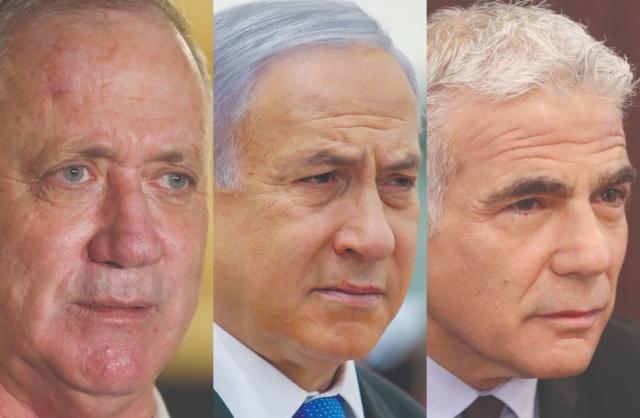A recent survey conducted by "Maariv" offers fresh insights into the preferences of the Israeli public regarding their political leaders, and simultaneously provides a glimmer of hope for the formation of a unity government featuring Benjamin Netanyahu and Benny Gantz. The gap between Gantz’s Blue and White party, which stands at 30 seats, and Netanyahu's Likud, at 27 seats, has widened this week from 2 to 3 seats. Moreover, the coalition bloc has lost a seat, reducing their total to 53, compared to the opposition parties and Arab parties' combined 67 seats. These findings were brought to light by the "Lazar Studies" institute, under the stewardship of Dr. Menachem Lazar.
When participants were asked, "If the Knesset elections were held today, who would you cast your vote for?" the responses were as follows: Blue and White secured 30 seats (no change from the previous survey), Likud had 27 (down from 28), Yesh Atid maintained 16 seats, Shas got 9, United Torah Judaism 7, Ra’am 6, Otzma Yehudit 5, Meretz 5, Religious Zionism 5, Israel Beiteinu 5, and Hadash-Ta'al increased to 5 from 4. The Labor Party, with 2.8%, and Balad, with 1.8%, fell below the electoral threshold.
Anew poll by Maariv puts Benny Gantz’s National Unity at the top spot with 30 seats, if a hypothetical election were held today. Prime Minister Benjamin Netanyahu’s Likud Party falls shortly behind with 27 seats. Put all together, the current coalition stands at 53 seats while…
— Vas (@crypticvalentin) August 4, 2023
Responding to the second question regarding their views on the formation of a unity government involving the Likud, Yesh Atid, and the Blue and White party, under Netanyahu's leadership, given the current circumstances in Israel, the participants expressed mixed feelings: 42% favored the idea, 45% were strongly against it, and 13% remained ambivalent.
On breaking down the responses by the three major parties' voters: 62% of the Blue and White voters were in favor, contrasted with 33% against it, while 5% had no opinion. Among Yesh Atid voters, 34% were supportive, 61% were opposed, and 5% remained undecided.
Joining Prime Minister Benjamin Netanyahu and the Likud in a unity government will "ruin the country," opposition leader MK Yair Lapid said on Ynet Radio on Monday morning, in response to growing calls over the past week for Lapid and National Unity chairman MK Benny Gantz to
— 2two k (@AbacusIavo) July 31, 2023
When classified according to the level of religious observance, opinions varied: secular and modern-orthodox individuals showed mixed feelings about a unity government, traditional followers were generally supportive of unity, while ultra-orthodox were more likely to oppose the idea, considering it might exclude their parties from the coalition.
Among Likud voters, 55% favored unity, 34% were opposed, and 11% were uncertain. When segmented by the degree of religious observance within Likud, 33% of ultra-orthodox voters were supportive, compared to 55% against and 12% undecided. Among the modern orthodox religious, the divide was nearly even, with 45% in favor, 46% opposed, and 9% unsure. The traditionalists' votes were split, with 49% in support, 39% opposed, and 12% undecided. Among the secular voters, the split was similar, with 46% supporting, 45% opposing, and 9% undecided.
This online survey, conducted from August 2-3, 2023, comprised 507 participants, representing a cross-section of Israel's adult population aged 18 and above, encompassing both Jewish and Arab residents. The maximum sampling error in the survey is 4.3%.


